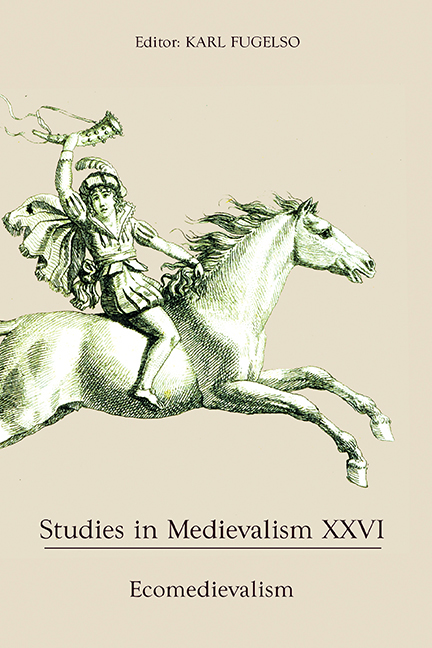Book contents
- Frontmatter
- Studies in Medievalism
- Acknowledgments
- Contents
- List of Illustrations
- Editorial Note
- I Ecomedievalism: Some Perspective(s)
- II Interpretations
- Fragmentary Dreams: John Aubrey's Medieval Heritage Construction
- Charter Horns and the Antiquarian Imagination in Early Modern England
- Giving Voice to Griselda: Radical Reimaginings of a Medieval Tale
- Medieval and Futuristic Hells: The Influence of Dante on Ellison's “I Have No Mouth and I Must Scream”
- Reading Westeros: George R. R. Martin's Multi-Layered Medievalisms
- Modernity in the Middle: The Medieval Fantasy of (Coopted) Feminism in Disney's Maleficent
- Future Medieval: (Neo)Medievalism in Babylon 5 and Crusade
- Cosmopolitan Anxieties and National Identity in the Netflix Marco Polo
- Mapping Everealm: Space, Time, and Medieval Fictions in The Quest
- Medievalisms of the Mind: Undergraduate Perceptions of the “Medieval” and the “Middle Ages”
- Mask of the Medieval Corpse: Prosopopoeia and Corpsepaint in Mayhem's De Mysteriis Dom Sathanas
- Contributors
- Miscellaneous Endmatter
Future Medieval: (Neo)Medievalism in Babylon 5 and Crusade
from II - Interpretations
Published online by Cambridge University Press: 15 September 2017
- Frontmatter
- Studies in Medievalism
- Acknowledgments
- Contents
- List of Illustrations
- Editorial Note
- I Ecomedievalism: Some Perspective(s)
- II Interpretations
- Fragmentary Dreams: John Aubrey's Medieval Heritage Construction
- Charter Horns and the Antiquarian Imagination in Early Modern England
- Giving Voice to Griselda: Radical Reimaginings of a Medieval Tale
- Medieval and Futuristic Hells: The Influence of Dante on Ellison's “I Have No Mouth and I Must Scream”
- Reading Westeros: George R. R. Martin's Multi-Layered Medievalisms
- Modernity in the Middle: The Medieval Fantasy of (Coopted) Feminism in Disney's Maleficent
- Future Medieval: (Neo)Medievalism in Babylon 5 and Crusade
- Cosmopolitan Anxieties and National Identity in the Netflix Marco Polo
- Mapping Everealm: Space, Time, and Medieval Fictions in The Quest
- Medievalisms of the Mind: Undergraduate Perceptions of the “Medieval” and the “Middle Ages”
- Mask of the Medieval Corpse: Prosopopoeia and Corpsepaint in Mayhem's De Mysteriis Dom Sathanas
- Contributors
- Miscellaneous Endmatter
Summary
Early in “The Long Road,” the second episode to be aired of J. Michael Straczynski's short-lived television series Crusade (1999), a character refers to the way of life of the inhabitants of a planet as “practically medieval.” It is a small comment, possibly used merely to indicate an ancient as opposed to contemporary way of life or level of technology; furthermore, since the series is set in 2267 CE, the human colony is an example, not of the medieval period, but of medievalism. Despite its brevity, this comment draws attention to medievalism (and neomedievalism) within this science-fiction series and its parent – Babylon 5 – and to the debate that “The Long Road” specifically enacts regarding what form of (neo)medievalism is productive. The moments of (neo)medievalism in Babylon 5 and Crusade exemplify categories at debate in scholarly journals such as Studies in Medievalism and demonstrate the usefulness to popular culture of the medieval as a contrast to the present. Babylon 5 and “The Long Road” tend to use such contrasts to question the opposition of past and present in order to suggest continuity and similarity, sometimes to celebrate perceived medieval ideals of justice and sometimes to comment on violence, past and present. However, resolving the past–present dichotomy, particularly in “The Long Road,” perpetuates a patriarchal vision, raising questions about the inherent gender politics of (neo)medievalism.
As four volumes (namely, numbers 17 to 20) of Studies in Medievalism explicitly attest, defining “medievalism” and “neomedievalism” has been a matter of scholarly discussion. The history of the terms and their use over time – from Leslie Workman or Umberto Eco to the contributors to the volumes of Studies in Medievalism just mentioned – suggest more than just that scholars have different opinions. Although all the scholars are concerned in some way with commenting on the “post-medieval attempt to re-imagine the Middle Ages, or some aspect of the Middle Ages,” the sheer variety of post-medieval engagements with the medieval make multiple definitions possible, depending on which factors – media, purpose, audience, among others – are emphasized in creating a definition.
- Type
- Chapter
- Information
- Studies in Medievalism XXVIEcomedievalism, pp. 161 - 176Publisher: Boydell & BrewerPrint publication year: 2017

